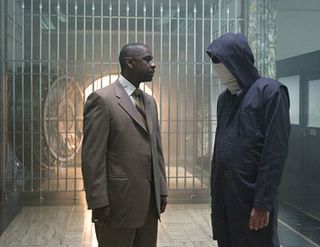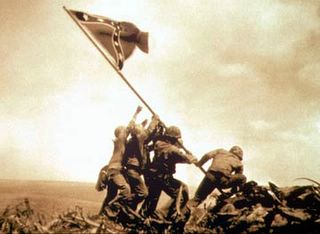Having said that, most of the landmarks of the Spike Lee joint remain. We return to the notion of New York as a pressure cooker for social, racial and class tension. Cinematographer Matthew Libatique, in his first collaboration with Lee, essentially creates a brighter version of Malik Hassan Sayeed's work in the director's Clockers - intrusive close-ups, garishly bright colors and, of course, the shot where the guy moves on a conveyor belt towards the camera. As in Clockers or He Got Game or The 25th Hour or Do the Right Thing, past injustices pollute the atmosphere of the present. About halfway through Inside Man, Clive Owen speaks a line that could fit snugly within just about any Spike Lee movie - "Murder will out."

The original twist here is all a matter of perspective. Lee gives us the scenario entirely from a cop's point of view. Generally, he seems to reject the notion of point-of-view entirely. His movies tend to drift between a variety of protagonists, giving the audience insight into everyone's perspective on the events of the story. Do the Right Thing is the most obvious example, zipping through the lives of an entire neighborhood full of angry, opinionated New Yorkers. But shifting attitudes and ambiguities run through all of the man's work.
Inside Man takes a story that's typically presented from one side - a bank robber - and turns it into a story about two cops solving a difficult case. The complexities behind the present crimes become illuminated only when Detectives Keith Frazier (Denzel Washington) and Bill Mitchell (Chiwetel Ejiofor) catch on to them. And it takes a while.
This is not entirely their fault, mind you. Several important factors are working against them. For one, there's the highly intelligent and surprisingly non-violent head of the gang of thieves (Clive Owen), who seems to have more on his mind than stealing away with a few hundred thousand dollars from vault. Then, there's the Chairman of the bank's Board of Directors (Christopher Plummer), a suspicious type who hires a mysterious "fixer" (Jodie Foster) to keep an eye on the escalating situation. Finally, there's the police captain (Willem Dafoe), who has apparently seen a movie like this before and knows it's his job to insist on bursting into the bank and killing everyone.
There are a few secrets revealed on the way to the conclusion which, of course, I will not ruin for you here. They are satisfying but not mind-blowing. In many ways, a movie like this is all about the last 10 minutes, and after two viewings, I kind of feel like Inside Man takes a bit too long to get to an ending that's merely satisfactory. It's a minor complaint overall. I have watched the movie twice and been thoroughly entertained both times. But still, with this sort of a thriller, it's better to save a bit more surprise for the very end. Leave the people wanting more.
Though it's unfortunate from a pacing standpoint, I can understand why Spike took his time wading through the murky backstory before simply wrapping up Inside Man. The "secrets" uncovered during the course of Frazier's investigation, in noirish fashion, relate to the most base kind of corruption. They are compelling enough to warrant a few more pre-credit scenes.
The crimes that have been hidden away in this Manhattan bank seem to run against the entire spirit of the place as presented in Lee's film. We see the diversity of New York. A tense, uneasy diversity, but a mainly peaceful one. What's unearthed is an evil that contradicts this version of reality, the kind of secret that's always hidden away behind vault doors, kept away from the average citizens who watch outside behind police tape.

Spike Lee's name is on the DVD box for CSA: The Confederate States of America, but it's one of those "Presented by..." deals where the filmmaker just let someone put their name on the box and doesn't actually have anything to do with the movie. I rented this independently-produced 2004 oddity not because of the association with Spike Lee, but because it sounded like a funny sort of concept...
What if the South had won the Civil War?
Writer/director Kevin Willmott's CSA approximates an alternate-universe British documentary, chronicling the history of the former United States of America from the immediate antebellum period to the present day. To enhance the effect of watching a real TV program, there are commercial interruptions and network identification spots.
Sounds funny, right? I expected some clever historical references, some redneck jokes and some clever Photoshop-style manipulation effects, like that imagined Iwo Jima above. But then, I didn't really understand Willmott's actual interests and intention. This movie is not at all funny. It is deathly serious and, in its own way, genuinely horrifying.
But perhaps I should explain. Willmott has imagined a world in which the South won the Civil War and therefore slavery remained legal. And remains legal to this day. Obviously, this changes everything about our national history, character, sense of ourselves...Well, everything.
But Willmott doesn't stop there! No, this is not just some takedown of slavery as an institution. He's poitning out how similar this imagined pro-slavery Southern nation would be to our history. Sure, the Emancipation Proclamation "freed the slaves," in other words, but it hardly put an end to prjeudice, hate or black suffering in America.
The film is very angry, very pointed and occasionally hard to take. It's blithe manner is, of course, part of the put-on. We're watching a universe in which slavery is not only legal but a beloved and sacred part of American culture. Of course they don't recoil from calling black men "bucks" or advertising Lo-Jack style collars intended to alert authorities to runaways. But that doesn't make it easier to watch if you happen to be from our version of reality.
What kept me watching was how deviously clever Willmott is at toying with the real history of America. Our encouraching interference in Latin and South American life and politics is mirrored by the (very real) plans for colonizing all of the Americas in the glorious name of the Confederacy. The infamous Watts riots of the 1960's are reconfigured as a modern slave rebellion. And real advertising icons - from Coon Chicken (immortalized in Ghost World) to Niggerhair cigarettes - are updated for contemporary tastes. (With a reminder that some of these characters, like Uncle Ben and Aunt Jemima, have never left us.)
Furthermore, he postulates how our approach to issues of race would come to govern our outlook and behavior as a nation. In World War II, he theorizes, we would have remained officially neutral but friendly with the Nazis. (Fake footage shows Hitler touring Washington D.C.) The Chinese immigrants who flooded West to build the railroads would have been converted forcibly into slave labor. Japanese internment would take on a new and even uglier face.
My favorite touch was an inspired nod to D.W. Griffith's Birth of a Nation, a hazily-recalled celebration of the Ku Klux Klan which obviously would never have come to pass if the South had won the war in the first place. With the South as victor, Griffith's film instead focuses on the plight of poor, sad, nigger-lovin' Abraham Lincoln, sneaking out of the country via Harriet Tubman's Underground Railroad. It's a wonderful comic inversion, and shot just like a real Griffith silent. A great sequence.
In addition to the Spike Lee credit, the DVD box for CSA advertises the film as funny. "Like Jean-Luc Godard directing a script by Dave Chappelle," reads one. I kind of get this, sort of. It's postmodern and experimental, like Godard. And it features sketches poking fun at the idea of slavery, like "Chappelle's Show." But that description makes it sound funny, and I rarely laughed during CSA. Very very rarely. It's savvy and even witty, sure. But not funny. I'll be telling this to people in the video store for weeks, I mgiht as well stress it to you readers out there.

Umm... hate to mention it, but Aunt Jemima was a real person. On the other hand, she was a Welshwoman, not an American black, so maybe you can complain about the brand name after all.
ReplyDeleteI'll agree that it wasn't remotely funny, but "CSA" was "witty". I found it to be very, very dumb.
A lot of effective data for myself!
ReplyDelete